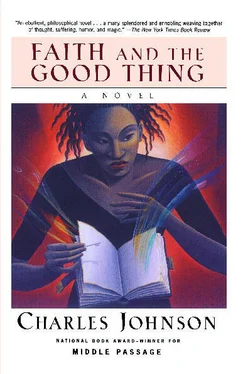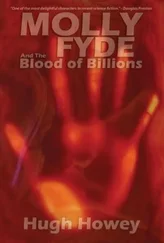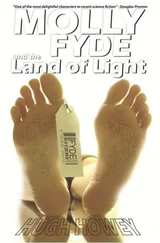The trees along the road were monstrous — huge, ungainly, sprouting twisting limbs gnarled in one space, skimpy in another, swollen in a third; they seemed made of clay, half-formed and moist, grooved along their length with deep lines that hinted at the great hand of God, old and haggard, holding His sculptor’s knife uncertainly, hesitating, then madly clawing at the clay of the trees in wrath or frustration or fearful divine woe. Terrible trees, these, washed by the light of an old moon, the star-sprinkled sky closest to its globe stained with a rich orange glow that emitted a stairway of rings and caught Faith’s eye through the frail, claylike fingers of the tree branches above. Such a moon was said to be magical, an omen, or a mysterious occurrence to which one could cast a wish and have it realized. She believed it, and felt the moon was an old friend. Often, she’d stepped outside the farmhouse to watch the moon after Lavidia had gargled, dropped her teeth into a glass of water, and gone to bed. Its cycles triggered the odd changes in her own body: pain, tranquillity, pain again. Which were strange. Lavidia called them an ancient curse, and warned Faith to stay away from men, abstain from grinding corn, milking cows, and sewing with a needle on the first day of bleeding. If the moon could be so cruel, might it not be equally kind and grant her wish?
She made a wish: “Let me find it — the Good Thing.”
And she repeated it several times on the train while watching the moon disappear behind the clouds. She relaxed, inviting the incubus, sleep filling up her stomach and mind, and drifted into a dream.
The Swamp Woman. She, Faith Cross, was the giggling old werewitch of the bogs, stirring with a divining rod a potion in her cauldron, a hellbroth that smelled like sewage and nine-day-dead alewives. Behind her the music of the spheres rang from the lizard-powered machine, each note as unsettling as a centaur’s cry. The bug-eyed squirrels and dirty chickens made gibbering noises like elves from their cages; the elves, chained to her workbenches, screamed like changelings, and the changelings, lying with bloated bellies on her benches, howled like whales (a strange sound, indeed). Into the cauldron she peered, and her lips exploded outward: “ Hee hee! ” It was done. Her brew looked like cough syrup and now had the scent and consistency of cod-liver oil. She tipped her cauldron over; its contents oozed to the sloping floor and spread like something sentient out the crooked shanty door, filling the swamp, choking spiny catfish and snails. It mixed into the bogs, which were as mysterious as the Swamp Woman herself — heavily misted with the mephitic odor of decay, swarming with insects and fish forgotten by the sleep of death, and thus allowed to spawn in the stagnant waters eternally. Often, at sundown, the water was as red as the blood of a calf — rich, opaque; then, at dawn, almost transparent enough for the bones of ancient beasts to be seen on its bottom. It held birth, and death, and now the Swamp Woman’s brew. Around the shanty, the swamp bubbled, overflowed the borders of the bog, and slid over the forests and hills of Hatten County. The brew ran endlessly from her cauldron, covering her knees as she waved her broken wand in wide arcs through the air and sang:
“If you find what’s Good,
You’d better knock on wood;
You’d better hold it fast,
’Cause it might not last—
You’d better squeeze it tight
And try to eat it all,
’Cause it’ll soon take flight
Like a — pterodactyl! Hee hee! ”
It covered the countryside, deluged the cities: it covered the world. Billions were covered with the brew. And when they managed to smear it all off, they looked like her: the Swamp Woman. Their limbs had become gnarled oak sprouting yellow boils, their flesh was as black as the ink of a squid. And all around the world people looked at each other, winked their clear yellow eyes evilly, and squealed in harmony:
“ Hee hee! ”
The dream dissolved, and Faith Cross slept the sleep of the dead.
Heretofore sweet Faith slumbered; then, past midnight, after two days’ tiring journey from Georgia to Chicago and a restless sleep in her train seat, Faith awoke to the wrenching of gears and a shrill whistle. Her car lurched backward, then was still, surrounded by the hissing of steam from engine valves. She rubbed her palms against her eyes, licked at a sour taste in her mouth, and smeared away moisture clouding her window. Outside, passengers with suitcases hurried through a semicircular terminal to a crowded exit. Brown men in dull black suits pushed carts piled higher than their heads with heavy luggage. The air rolled with steam. Faith pulled her bag from a gunmetal-gray rack overhead and hurried through the narrow aisle to the door. She stepped from the car, shivering in the midst of a fast-moving crowd that passed her on both sides, jostled her and, before she was in the clear, had brushed off her sign. She followed the other passengers down the broad strip to a bright waiting room. Men and women met, embraced, and left arm in arm. Others raced off alone, if no one met them, toward stairs at the rear of the room. Where was she to begin? Who in this room looked friendly enough to answer her questions? Their steps seemed to have a definite direction, their heels rang against the tiled floor with efficiency, with system and method. Faith stepped timidly in the shadow of a couple in matching trench coats and tams, following them at a safe distance up a slow escalator, down several narrow corridors plastered with political posters peeling with age, and into a hallway with parquet floors ending on the street level.
She felt panic when she reached the outside. The couple had already climbed into their car at the curb and driven off. Where, she had intended to ask, can I find a room? A meal? But they were gone. The street was silent save for the thudding of car tires on cobblestones and, from around the corner, the blast of horns. Standing still, her bag swinging at her side, she felt she’d entered a place desolate, despised by man, a canyon of jagged walls. The air was cold and heavy in her lungs. Her breath hovered before her face as blue wisps of steam. The sidewalk, too, was cold beneath her feet, its icy surface tearing at her soles as she hurried down the street to keep warm. A sign on the corner said Sixty-fourth. Which told her nothing. The storefronts were all covered with lengths of metal latticework. At the far end of the block she saw a man wearing sunglasses and a green army jacket leave a telephone booth at the bus stop. Faith approached him.
“Que es esto?” the man said, almost shouting. He backed away from her as if she held a summons. Cried, “Vayaaa!”
“I’m just trying to find a room,” she said, stepping closer. “I just now got off the train—”
He raised his glasses to his brow, squinted his black eyes at her, said, “No comprendo,” tersely, and backed away. He saw his bus turn the corner, and bolted into the street to meet it. From the rear window he frowned at her.
In the shiny glass of a Japanese curio shop she saw her reflection. You would have thought a witch had ridden her all night. (They do that, witches. The hags turn you over on your stomach when you’re sleeping, shove a bit into your mouth, and ride you on all fours for hours. All night long. And in the morning you feel real blue and ache from head to toe.) Her dress, though skimpy and a riot of wrinkles, was still somewhat, though only barely, intact. Her hair was drawn up and matted in dark clumps; her skin had turned ashy and gray from the cold. Her mouth and nose — dry. Her stomach grumbled. It pinched with a hunger bordering on nausea. Looking away, she saw the city lights grow brighter, more numerous on the far side of the bridge that began just across the street. Faith started across, but stopped midway when a particularly vicious cramp knotted in her right side. She was used to gales, to soothing sirocco summers. The cold began to slow her movements, to seep beneath her skin. To burn. Faith’s feet went numb, like weights cemented to her ankles. Her fingers stiffened. A small fire engine shot from around the corner, its bells ringing as it rumbled over the bridge and down a boulevard lined with bare leafless elms, and farther on, sirens blaring, to red flames twisting into the sky from a burning water tower. It was here, on this chilly South Side bridge, that Faith grew afraid, quailed and pined for home. She was alone, and in a strange city. Hadn’t the Swamp Woman said she was a Number One and, therefore, needed direction to avoid disaster? Neither Todd nor Lavidia had prepared her to be alone. She wasn’t equal to the occasion. But she couldn’t say Todd didn’t prepare her for fear.
Читать дальше












